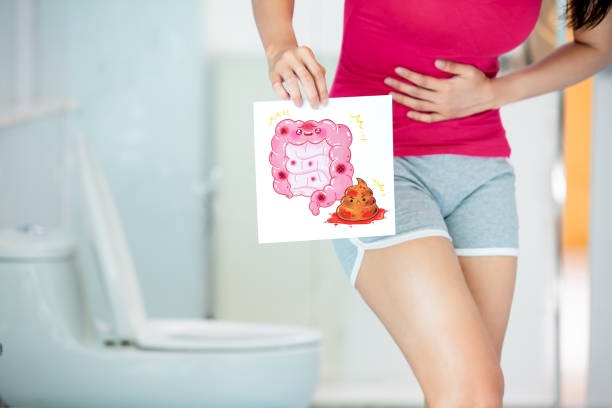Understanding the Causes of Bloody Stools and How to Treat Them
[ad_1]

According to Healthline – The appearance of blood in the faeces may indicate bleeding in the digestive tract. This condition should not be underestimated as it could indicate a serious illness. To help you understand, check out the various causes of bloody faeces and how to deal with them.
Types of bloody faeces:
There are two types of bleeding in the digestive tract that commonly cause bloody stools: haematochezia and melena.
Both are distinguished by the colour of the blood and the location of the bleeding.
Hematochezia:

Hematochezia is characterised by the bright red colour of the blood. This condition occurs when the colon is bleeding.
The colon is located not far from the anus so the blood that comes out is fresh. Meanwhile, the blood can be mixed with faeces or separate.
Compared to melena, haematochezia tends to cause minor bleeding.
Melena:
Melena results in jet-black stools like pen ink and a mushy texture. In addition, the faeces may look and feel sticky.
The blood darkens as it has to travel further through the digestive tract. By the time it reaches the anus, the blood has been deoxygenated and the colour turns dark.
What causes bloody faeces?
Piles are the most common cause of bloody faeces. In addition, there are various other conditions that can trigger this problem.
1. Damage to the upper digestive tract

The first cause of bloody faeces is damage or other problems affecting the stomach or oesophagus.
If this is the case, the blood may look blacker because it has travelled a long way to the anus.
Before administering medication or treatment, the doctor will need to find out what is causing the damage to the upper digestive tract.
2. Fissure ani
An anal fissure is a tear in the anal wall. This condition is usually caused by constipation or by passing large, hard stools.
Ways to relieve the symptoms and pain of anal fissure can be done by using pain relief creams.
In addition, you can take stool softeners to prevent bleeding.
In general, anal fissure tears can heal on their own.
3. Polyps

One of the reasons why bowel movements bleed is the growth of polyps or flesh growths in the rectum and colon. Polyps are abnormal tissues that can grow in various parts of the body.
Whilst not cancerous, some polyps can develop into malignancies.
In most cases, the doctor may use specialised tools through a colonoscopy or flexible sigmoidoscopy procedure to remove polyps in the colon.
Afterwards, the doctor will examine the polyps to see if they are cancerous or not.
4. Piles
As previously mentioned, piles or haemorrhoids are one of the most common causes of bloody bowel movements.
Piles are swollen veins in the anus that can cause itching and burning.
If the blood in the stool is due to piles, the blood may be fresh red in colour.
The way to treat bloody stools naturally due to piles is to increase your intake of fibre and water. You can also take over-the-counter haemorrhoid medications.
However, your doctor may recommend surgery if various natural treatments are not working, the case is classified as an emergency (heavy bleeding), or the piles are painful and interfere with daily activities.
5. Angiodysplasia

If there is no obvious digestive disorder causing bloody stools, angiodysplasia may be the trigger.
Angiodysplasia is a blood vessel disorder in the gastrointestinal tract. This condition is commonly associated with kidney disease and von Willebrand disease.
Treatment for bloody stools caused by angiodysplasia can include hormone therapy, regular blood transfusions and iron supplements.
Fortunately, in most cases, bleeding due to angiodysplasia stops on its own.
6. Inflammatory bowel disease
Inflammatory bowel disease (IBD) is an autoimmune disease that causes chronic inflammation of the digestive tract.
The most common types of IBD are Crohn’s disease and ulcerative colitis.
To alleviate the symptoms, your doctor may recommend the use of steroids or immune-boosting drugs.
In more severe conditions, people with IBD may have to undergo surgery.
7. Diverticular disease
There are two types of diverticular disease, diverticulosis and diverticulitis. Both can cause bloody bowel movements.
Diverticulosis is a condition where pouches form in the colon due to weak colon walls. If these pouches become infected, the condition is called diverticulitis.
The medication for bloody bowel movements that can be taken to treat diverticulitis is antibiotics.
However, people with diverticulitis may also be hospitalised.
8. Ischaemic colitis

Did you know that ischaemic colitis is one of the causes of bloody stools?
This condition occurs when blood flow to the colon is reduced or blocked. Almost 90 per cent of sufferers are elderly people.
In addition, ischaemic colitis can also cause diarrhoea, difficulty holding a bowel movement, abdominal pain and vomiting.
The good news is that this condition is relatively quick to heal and can get better on its own.
However, there are also severe cases where the sufferer must be hospitalised. About 20 per cent of them even require surgery.
9. Colorectal cancer
About 3.4 per cent of bloody bowel movements may be due to colorectal cancer. Colorectal cancer is the term for cancer in the colon and rectum.
When tumours arise from these cancers, they need blood vessels to develop.
The problem is that the blood vessels in the colon are considered fragile and can tear, causing bleeding.
Colorectal cancer is generally treated with surgery. In addition, radiation therapy and chemotherapy may also be recommended by doctors.
Keep in mind that there are some things that can potentially trigger bloody but painless bowel movements, such as pigments or dyes in red foods.
There are also foods that cause bloody stools. Usually, this problem occurs in people who have allergies to certain foods and drinks.
These foods and drinks can irritate the intestinal wall, causing inflammation and bleeding.
Can bloody bowel movements heal on their own?
Most cases of bloody stools in middle-aged and elderly people are due to haemorrhoids.
On the other hand, in 95 per cent of cases, the blood that comes out with the stool stops without treatment. However, this does not mean that the underlying condition is cured.
Therefore, it’s best to see a doctor to find out which condition is causing the blood in the faeces.
Thus, the best treatment can be given so that you can recover soon.
When to see a doctor?
Blood in the stool can be a sign of an emergency. Visit the hospital immediately if any of these symptoms occur.
Cold and clammy skin;
Feeling confused;
Persistent rectal bleeding;
Fainting and dizziness;
Painful abdominal cramps;
Rapid breathing;
Severe rectal pain;
Severe nausea;
Vomiting blood;
How to diagnose bloody faeces;
To diagnose bloody stools, your doctor will ask you questions such as when you noticed the blood in your stool, what the accompanying symptoms are, and the colour of the blood.
After that, the doctor may perform one of the following tests.
Physical examination
The doctor will perform a physical examination of the body parts affected by the bloody stool condition.
Using lubricated gloves, the doctor will insert a finger into the rectum to see if there is anything abnormal, such as piles.
Endoscopy:
In this procedure, the doctor will insert a thin, flexible scope fitted with a camera into the anus to take a closer look at the area.
Blood tests:
A complete blood test can help assess the level of bleeding and show if the patient is anaemic.
Stool examination:
Stool examination can help doctors detect bleeding that is not visible.
Gastric lavage:
If stomach problems are suspected as the cause of bloody faeces, your doctor may perform a gastric lavage by inserting a tube through the nose into the stomach.
Afterwards, the contents of the stomach will be flushed out so that the doctor can see if there is any bleeding.
Imaging tests:
Imaging tests in the form of scans or X-rays may be performed. It is likely that the doctor will also involve a contrast agent, such as barium.
How to prevent bloody bowel movements:
To avoid the risk of bloody bowel movements, follow these tips;
Eat high fibre foods regularly (unless not permitted by your doctor);
Consult your doctor or pharmacist for stool softeners (to be taken by mouth);
Exercise regularly to prevent constipation;
Keeping the rectal area clean;
Drinking water regularly to keep your body hydrated;
If you have any questions about the causes of bloody stools, don’t hesitate to ask your doctor.
Content created and supplied by: Trendyhealth (via Opera
News )
Opera News is a free to use platform and the views and opinions expressed herein are solely those of the author and do not represent, reflect or express the views of Opera News. Any/all written content and images displayed are provided by the blogger/author, appear herein as submitted by the blogger/author and are unedited by Opera News. Opera News does not consent to nor does it condone the posting of any content that violates the rights (including the copyrights) of any third party, nor content that may malign, inter alia, any religion, ethnic group, organization, gender, company, or individual. Opera News furthermore does not condone the use of our platform for the purposes encouraging/endorsing hate speech, violation of human rights and/or utterances of a defamatory nature. If the content contained herein violates any of your rights, including those of copyright, and/or violates any the above mentioned factors, you are requested to immediately notify us using via the following email address operanews-external(at)opera.com and/or report the article using the available reporting functionality built into our Platform
See More
[ad_2]



